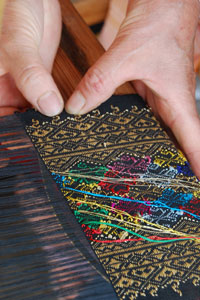
The Alliance for California Traditional Arts (ACTA) is pleased to announce the publication of Weaving Traditional Arts Into the Fabric of Community Health, a briefing on the potential to promote health through engagement in community-centered traditional arts. The briefing presents an overview of the burgeoning field of arts-for-health, as evidenced by evaluations of two of ACTA’s signature programs: the Living Cultures Grants Program and the Apprenticeship Program.
This briefing will be of particular interest to funders and organizations with a mission to support programming in the fields of the arts, health, and community development, as well as to artists and researchers in the fields of community medicine and public health and policy, the folk & traditional arts, and community-based arts and culture.
Aware of mounting evidence that community-based arts may positively impact health and well-being, ACTA commissioned studies by UC Davis’s Center for Reducing Health Disparities and the Asian American Center on Disparities Research to formally investigate health effects and other outcomes experienced by participants in two representative programs. ACTA’s Living Cultures Grants Program funds nonprofit organizations to support exemplary projects in traditional arts in California; the Apprenticeship Program encourages the continuation of the state’s traditional arts and cultures by contracting master artists to offer intensive, one-on-one training to qualified apprentices. Weaving Traditional Arts into the Fabric of Community Health presents the UC Davis findings with an overview of selected research in the emerging field of arts-for-health, as well as scholarly references and a selection of global resources in the fields of traditional and folk arts and arts-for-health.
A careful reading provides provocative and hypothesis-generating insight into associations between participation in, and performance of traditional arts, and the potential to promote individual and public health. With its deep connections to community-centered traditional arts, its sensitivity to the artistic process, yet its appreciation for rigorous scientific inquiry, ACTA is uniquely poised to partner with multidisciplinary health and social science researchers to create, facilitate, and evaluate novel health interventions utilizing traditional arts. Such partnerships hold the potential to support health “as a state of complete physical, mental, and social well-being rather than merely the absence of disease or infirmity.”
As observed by ACTA’s Executive Director, Amy Kitchener, “We have known for a long time that community engagement in traditional arts has many types of positive effects that relate to individual and community health…we wanted to find a way to move beyond a series of individual anecdotes shared with the ACTA staff to a more formal evaluation process that could begin to quantify some of the important effects, particularly the connection between community-based traditional arts and health.”
Among the salient findings, and recurrent themes articulated by participants were that participation in ACTA programs led to:
• Enhancement of Physical and/or Mental Health
• Clarification of Future Goals
• Perception of Positive Social Characteristics/Self-Esteem
• Desire to Grow and Continue Learning
• Spiritual and Emotional Connection to Art and Culture
• Self-Actualization
• Enhanced Identity
• Community Involvement
ACTA’s long-standing connections with California’s cultural communities positions ACTA to be a pivotal partner with health researchers interested in designing or measuring health interventions utilizing traditional arts. ACTA’s relationships also situate it as a logical partner for implementation of arts-in-health programs, particularly those aimed at well-being of the aging population, preventive health interventions for youth and young adults, and well-being of new immigrant populations.
The research and preparation of Weaving Traditional Arts into the Fabric of Community Health were funded by generous support from The California Endowment and the UC Davis Health System, Center for Reducing Health Disparities.
DOWNLOADS:
Weaving Traditional Arts Into the Fabric of Community Health – Summary of the UC Davis evaluations of ACTA programs and overview of selected research
Initial Phase Recurring Themes
Evaluation of the Alliance for California Traditional Arts (ACTA) Apprenticeship Program
Evaluation of the Alliance for California Traditional Arts (ACTA) Living Cultures Grants Program
